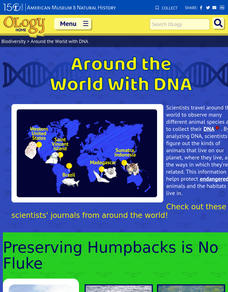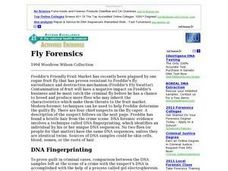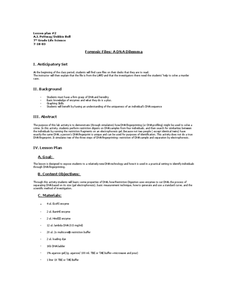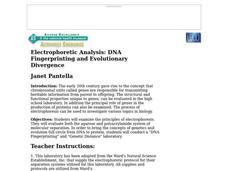Howard Hughes Medical Institute
CSI Wildlife
Can DNA fingerprinting prevent the extinction of elephants? Young scientists learn about DNA fingerprinting before applying their knowledge to case studies of elephant poaching. The first case requires them to match the DNA from a tusk...
K20 LEARN
More than Skin Deep
From crime to paternity, DNA fingerprinting has revolutionized how the world views inherited traits. Science sleuths investigate the facts about DNA profiling through a variety of activities. The Teacher's Guide includes printable...
Beyond Benign
Who’s Your Daddy? Finding the Father
Time for the reveal! The nineth lesson of the series of 18 has scholars compare DNA fingerprints of cats to their samples to identify the father of Sparky's kittens from previous lessons. They analyze the DNA bands to determine the match.
American Museum of Natural History
DNA Detective
Match up the DNA code. Pupils read the website from the American Museum of Natural History about how DNA can determine whether a skin is from a particular type of reptile. Using the same technique, learners match up products with the...
American Museum of Natural History
Around with World with DNA
A mammalogist, ornithologist, ichthyologist, and a conservation geneticist share their work and their hopes that their research will help protect and save endangered species and their habitats.
New York City Department of Education
Grade 9-10 Literacy in Science: Using DNA to Solve a Crime
Scholars become detectives and use science to solve a crime! A complete unit introduces DNA and includes hands-on activities that have learners model DNA and extract it from different food types. A culminating activity challenges...
Kenan Fellows
Unit 2: DNA Analysis
Ever wonder how they solve those mysterious murders in TV crime dramas? The second of four units in a Biotechnology series introduces scholars to the many methods of DNA analysis. Pupils create and run their own gel electrophoresis...
Howard Hughes Medical Institute
DNA Profiling Activity
Everyone loves a good mystery ... can your class actually solve one? Partnered pupils take on the role of forensic investigators during a three-part activity focusing on DNA evidence processing. Learners discover the methods used to...
Teach Engineering
DNA Forensics and Color Pigments
Use food coloring in electrophoresis. The last segment in a four-part series mimics DNA fingerprinting by using chromatography. Teams conduct chromatography on food coloring to find colors that use similar pigmentation in their makeup.
Teach Engineering
Restriction Enzymes and DNA Fingerprinting
Show your class why restrictions aren't always a bad thing. In the third segment of a four-part series, the instructor develops the idea of restriction enzymes. Pupils learn how scientists use restriction enzymes in DNA analysis and DNA...
Curated OER
Fly Forensics
Freddy's Friendly Fruit Market is under attack by fruit flies, and it is up to your aspiring biologists to solve the crime! By reading and analyzing the phenotypes, detectives determine which fly is responsible. This memorable assignment...
Curated OER
More Basic Biotechnology Tools, Sorting & Copying DNA
You can use these slides to explain the many complicated steps of the Polymerase chain reaction. The diagnostic and forensic uses of gel electrophoresis are detailed. This PowerPoint could be used to communicate facts, and also to...
Curated OER
DNA Fingerprinting
Learners discuss methods used by forensic scientists and the basics of DNA and how it can be used to identify an individual after reading an article from The New York Times.
Curated OER
Forensic Files: A DNA Dilemma
Seventh-graders come in to science class to find a file on their desks detailing a crime to be solved! As a demonstration, you simulate the restriction of DNA samples and separate them by electrophoresis. From the gel, learners can...
Curated OER
More Basic Biotechnology Tools
You can use these slides to explain the many complicated steps of the Polymerase Chain Reaction. The diagnostic and forensic uses of gel electrophoresis are detailed. This PowerPoint could be used to communicate facts, or to prompt...
Curated OER
Who Ate The Cheese?!
In this crime scene investigation worksheet, students simulate DNA sequencing and DNA restriction analysis using paper strips of DNA. Students compare the crime scene DNA to the suspects and determine who is guilty.
Curated OER
Electrophoretic Analysis: DNA Fingerprinting and Evolutionary Divergence
Students examine the principles of electrophoresis. They evaluate both the agarose and polyacrylamide system of molecular separation. In order to bring the concepts of genetics and evolution full circle from DNA to protein, students...
Curated OER
DNA Technology
In this DNA technology worksheet, students look at genetic engineering and how it has helped humans. Then students will read about the human genome and how DNA fingerprinting is used in crime scenes. This worksheet has 4 short answer...
Curated OER
Genetic Technology
In this genetic technology learning exercise, students will answer 6 true or false statements and 4 short answer questions based on the mapping and sequencing of the human genome and the applications of the Human Genome Project.
Curated OER
Electrophoresis Analogy
Pupils participate in a simulation of electrophoresis separation of DNA fragments. They link arms to form DNA fragments with each student representing a nucleotide. As they move through an obstacle course they discover how fragments of...
Curated OER
Polymerase Chain Reaction and DNA Profiling
Students examine DNA fingerprinting and polymerase chain reaction and how they are used in everyday life and for criminal investigations. They discover how these techniques can also be used to answer ecological and evolutionary questions.
Cold Spring Harbor Laboratory
Dna From the Beginning
At DNA from the Beginning, choose from classical genetics, molecules of genetics, genetic organization and control. Each concept is explained through animation, an image gallery, video interviews, biographies and links.
PBS
Pbs Learning Media: Forensics and Dna Profiling
Find out how DNA profilers analyze bits of tissue to identify human remains. From the NOVA: "Lost on Everest" Web site.
PBS
Pbs Learning Media: How Dna Evidence Works
In this article by An Meeker-O'Connell, discover how DNA evidence is processed before it goes to court.
























